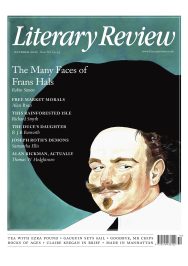Keshava Guha
Old Hobbits Die Hard
Twenty-First-Century Tolkien: What Middle-Earth Means to Us Today
By Nick Groom
Atlantic Books 448pp £20
Like many epics, The Lord of the Rings has a framing conceit. J R R Tolkien presents himself not as its original author but as a translator – of the hobbit-composed Red Book of Westmarch, part of which is a memoir by Bilbo Baggins. In the first chapter of The Lord of the Rings, ‘A Long-Expected Party’, Bilbo is looking to get away from the Shire to a quiet place where he can finish this memoir. He has thought of an ending: ‘He lived happily ever after to the end of his days.’ ‘Nobody will read the book, however it ends,’ comes his friend Gandalf’s bantering reply. Gandalf, first the Grey, later the White, would have made a poor publisher. Through Tolkien, Bilbo’s book has been read by more people than almost any other in human (or hobbit) history.
The Lord of the Rings was the first book I ever bought. I was eight and had just won a book token in a local quiz. That green paperback may have been one of the last editions of The Lord of the Rings with a cover containing no reference to Peter Jackson’s films. It carried, instead, a quote from the Sunday Times: ‘The English-speaking world is divided into those who have read The Lord of the Rings and The Hobbit and those who are going to read them.’
Nick Groom’s new book is explicitly pitched to the second of these two groups, but it is more likely to appeal to the first. Its publication is timed to coincide with the release of The Rings of Power on Amazon’s streaming service. ‘The huge anticipated global audience’ of this series, Groom writes, ‘may well benefit from a book on Tolkien’ that identifies ‘why the books and media adaptations have been so popular.’ He promises a ‘non-hierarchical’ overview of the Tolkien universe, in which the author’s own writings have no canonical status within the corpus of Tolkien-inspired works.
There are two books here – one a rigorous, omnivorous exercise in scholarship, the other a gratingly modish argument for Tolkien’s relevance. I think of one book as ‘Tolkien’, the other as ‘Twenty-First Century’. The former contains almost all the best material and all the best writing; the

Sign Up to our newsletter
Receive free articles, highlights from the archive, news, details of prizes, and much more.@Lit_Review
Follow Literary Review on Twitter
Twitter Feed
It wasn’t until 1825 that Pepys’s diary became available for the first time. How it was eventually decrypted and published is a story of subterfuge and duplicity.
Kate Loveman tells the tale.
Kate Loveman - Publishing Pepys
Kate Loveman: Publishing Pepys
literaryreview.co.uk
Arthur Christopher Benson was a pillar of the Edwardian establishment. He was supremely well connected. As his newly published diaries reveal, he was also riotously indiscreet.
Piers Brendon compares Benson’s journals to others from the 20th century.
Piers Brendon - Land of Dopes & Tories
Piers Brendon: Land of Dopes & Tories - The Benson Diaries: Selections from the Diary of Arthur Christopher Benson by Eamon Duffy & Ronald Hyam (edd)
literaryreview.co.uk
Of the siblings Gwen and Augustus John, it is Augustus who has commanded most attention from collectors and connoisseurs.
Was he really the finer artist, asks Tanya Harrod, or is it time Gwen emerged from her brother’s shadow?
Tanya Harrod - Cut from the Same Canvas
Tanya Harrod: Cut from the Same Canvas - Artists, Siblings, Visionaries: The Lives and Loves of Gwen and Augustus John by Judith Mackrell
literaryreview.co.uk